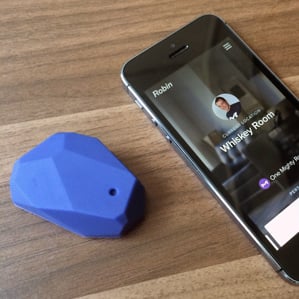In the office of the future, you may not so much walk into a room as log into it automatically. That’s what Sam Dunn, the CEO and co-founder of Boston-based startup Robin, thinks. The company is using wireless sensors to make rooms in office buildings aware of the people in them and let employees know exactly where their co-workers are.

With Robin’s software, when employees walk into a room, their smartphones alert a wireless transmitter using Bluetooth LE. They can then share certain predefined information with colleagues, which might be different for, say, a conference room than for a kitchen. When someone walks into a meeting, for instance, everyone else at the table could automatically have access to the person’s name, Twitter handle, LinkedIn profile, and perhaps a shared presentation on Dropbox. The system currently works with iBeacons, wireless network sensors developed by Apple to alert iOS devices when they’re in particular locations, and a few other Bluetooth LE devices.
So far, the Robin system has been implemented in a limited number of pilot locations. News Corp, the newspaper and publishing company, uses it on its executive floor in New York for room and desk booking; a handful of co-working spaces around the country use it to keep track of general room use and availability.
Don’t settle for half the story.
Get paywall-free access to technology news for the here and now.